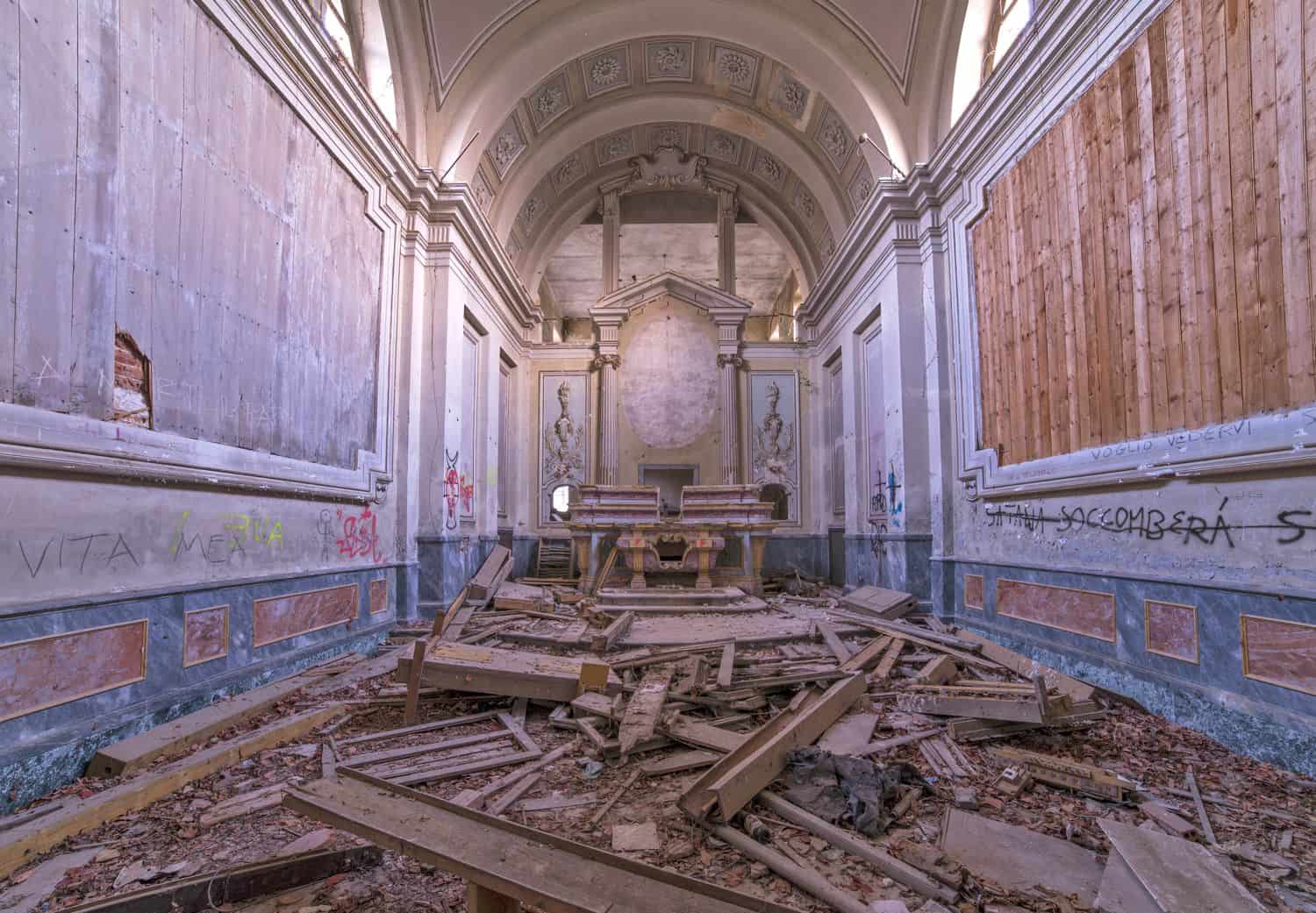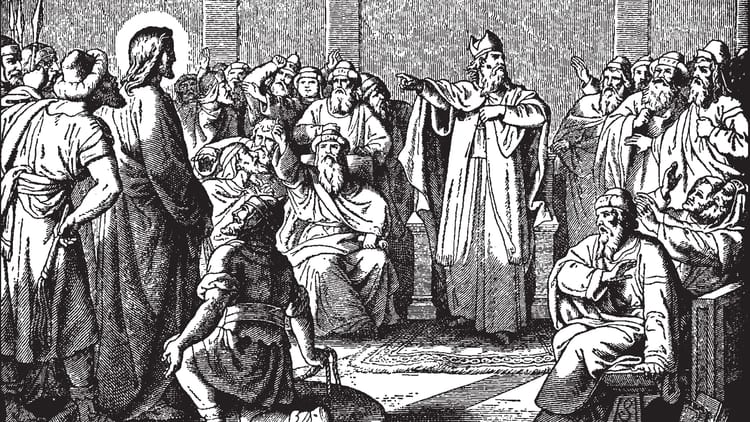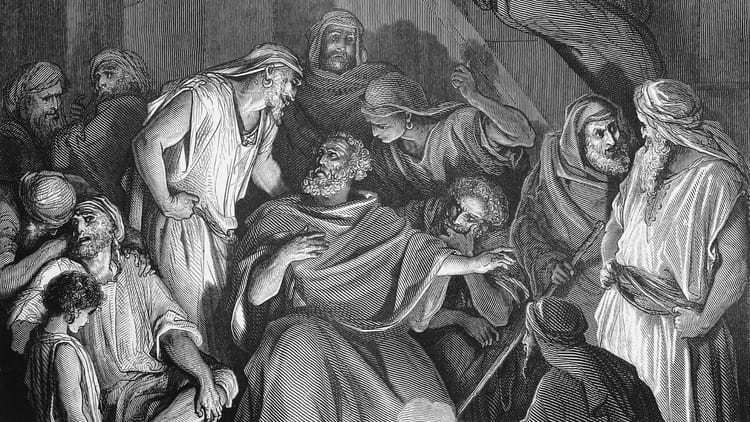Thriving in His Space (Mark 11:11-25)

Big Idea: God always creates places for people to walk with him and know him. That place is now the church.
It was one of the most anticlimactic moments of my life. I was in Israel with Charlene. We had traveled to Joppa and Galilee. The day had come. We were finally going to arrive in Jerusalem. I’d read stories of people who’d arrived in Jerusalem the first time, and I expected to be moved. The highlight for me was going to be standing at the site of the ancient temple.

Imagine. This is the site where Abraham was willing to offer his son Isaac to God, before God provided a ram as a sacrifice. It’s where King David built an altar in the middle of a plague. It’s where Solomon built the temple. It’s the place where we read:
As soon as Solomon finished his prayer, fire came down from heaven and consumed the burnt offering and the sacrifices, and the glory of the LORD filled the temple. And the priests could not enter the house of the LORD, because the glory of the LORD filled the LORD’s house. (2 Chronicles 7:1-2)
It’s where the Babylonians destroyed the temple, and it’s where Zerubbabel rebuilt the temple, later enhanced by King Herod. It’s where Jesus himself walked and taught.
Josephus, one of the most famous historians of that day, wrote that Herod’s temple project was “the most glorious of his actions…sufficient for an everlasting memorial of him.” He said that “the exterior wanted nothing that could astound either mind or eye.” The sanctuary was covered with gold and silver, crimson and purple. As you approached Jerusalem, you would sometimes be blinded by the sun reflecting on the gold. It would dazzle you. It’s been said that Jerusalem wasn’t a city that had a temple; it’s more like the temple that had a city. The temple was a huge deal.
Now, I knew it wasn’t like that anymore, and that a mosque now stands where the temple used to be, but I still wasn’t prepared for how I felt. You know those photos of downtown Detroit of buildings that used to be glorious but are now ruins? That’s what it felt like.

This is kind of a big deal, too, because it’s a huge part of the central message of the Bible. It seems that God has left the building.
The Message of the Bible
We’re in this series The Heart of God’s Story. And today we’re in the second last week.
If someone asked you what the Bible’s all about, there are at least two ways you could respond.
One is to give them an overview of the story, the plot, of the Bible. We did this one time as a church in our early days. We broke the Bible into four parts: creation, Fall, redemption, and restoration.
- Creation — God made this world, and everything in it, to be good. He designed it for human flourishing, so that we could live in joy in his presence, worship him, and love him and one another forever.
- Fall — Adam and Eve rejected God’s rule and rebelled against him. Because they represented all of humanity, their choice affects us too. We are, by nature and by action, enemies of God. Our rebellion against God has brought both physical and spiritual death.
- Redemption — God, who could have rightfully judged us all for our rebellion, initiated a rescue plan to redeem the world and to rescue sinners. He sent his Son, Jesus, to live, die, and be raised again to renew the world and restore his people.
- Restoration — God promises to renew and restore the whole world, and he’s given us a taste of this right now.
That’s one way to summarize what the Bible’s all about. It’s the plot line of the Bible.
But that’s not what we’re doing. Last week, this week and next week, we’re trying to summarize the Bible by talking about its major themes. D.A. Carson, a top biblical scholar, estimates that there are 20 large themes and 60 smaller themes that run throughout the whole Bible. We’re just looking at three of them:
- Knowing God’s face — that God’s presence is a key to the biblical narrative
- Thriving in his space — that God always creates places for people to walk with him and know him
- Extending his grace — that God wants to extend his grace into the whole world
Last week we looked at the first theme, at the importance of God’s presence; that we were made for his friendship, presence, and glory. This week we’re looking at the second theme: God always creates places for people to walk with him and know him. A. W. Tozer says, “God’s presence is the central fact of Christianity.”
The Problem
And here’s the problem: God has left the building.
In the passage we just read, Jesus has entered Jerusalem as the triumphant Messiah. We read in verse 11:
And he entered Jerusalem and went into the temple. And when he had looked around at everything, as it was already late, he went out to Bethany with the twelve.(Mark 11:11)
This was the place that had been holy ground for a thousand years. God’s presence had once so filled the Temple that the priests could not enter, and all Israel knelt on the pavement outside as they saw the fire of glory descend on the Temple. The prophet Isaiah had a vision of God’s robe filling this temple.
Not only that, but this was the height of its activity. It was Passover week. It’s estimated that almost three million people were in Jerusalem to celebrate Passover in a city that usually only had a population of 100,000 people. This was the holiest time of year in the holiest place on earth, the place where God himself had chosen to dwell.
Everything was going on like it did every day. Sacrifices were being offered. People were worshiping. Crowds gathered. Jesus took it all in, and he wasn’t impressed.
How do we know this? Because the next day he curses a fig tree. He goes to it and expects to find fruit, and there’s no fruit, so he curses it and it dies. This, by the way, is the only miracle of destruction in the gospels.
And then he goes and clears out the temple. He can’t stand what’s happening there. And then, Mark returns to the fig tree.
What’s going on here? You may be wondering what’s happening with the fig tree, and you’d be right. In this passage, the fig tree represents the temple, and Jesus is done with it. The point that Jesus is making is that God has completely abandoned the temple. The fig tree represents the temple. There should be life there, but there’s not. It’s barren. It’s done. God is no longer present. He has rejected it. And here’s the scary part: nobody even noticed.
I want to pause here to let this sink in. We were made for God’s presence. In fact, one way to explain the Bible is to explain it as a series of places where God chooses to live with his people:
- first, the Garden of Eden
- then the tabernacle
- then the temple
God always creates places for people to walk with him and know him. But now Jesus is saying that God has left the temple. This is really bad news. Not only that, but it seems like this happened a long time ago. In Ezekiel 10 we read that the glory of the Lord leaves the temple, so that all that was left was the shell. We never read that God came back.
The preacher David Platt says, “The presence of God may just be the most acknowledged truth of Christianity, but least realized and least experienced truth of Christianity.” What he means is this: we believe in God’s presence, but not many of us experience it. We were made for God’s presence, but we’ve grown so accustomed to the way things are that we don’t even realize it. I’ve lived with Charlene for almost 26 years now. If she moved out three years ago, and I didn’t notice, we’d all agree that I had a problem. And yet this is our condition with God.
Within forty years of Jesus cursing the temple, the Romans destroyed the temple. To this day, the only thing left of the Solomon’s temple or the second temple are some walls and some stones that were cast down.
God always creates places for people to walk with him and know him. But it’s no longer a building, and it never will be again. If you want to meet with God, don’t bother traveling to the temple in Jerusalem. God’s not there anymore.
The New Temple
So if one of the major themes in the Bible is that God always creates places for people to walk with him and know him, and the temple is no longer that place, where is it?
Read verses 22 to 25 with me:
And Jesus answered them, “Have faith in God. Truly, I say to you, whoever says to this mountain, ‘Be taken up and thrown into the sea,’ and does not doubt in his heart, but believes that what he says will come to pass, it will be done for him. Therefore I tell you, whatever you ask in prayer, believe that you have received it, and it will be yours. And whenever you stand praying, forgive, if you have anything against anyone, so that your Father also who is in heaven may forgive you your trespasses.” (Mark 11:22-25)
What happens here is remarkable. Jesus turns away from the temple and turns to his followers, just a handful of very unimpressive, inconsistent people. And he says to them that the action is no longer in the building that has been at the center of redemptive history for a thousand years. The action is now in this believing, praying community. God is now present there, with them. They can pray, and God will hear. They are the new meeting place with God.
God first met with his people in the Garden of Eden. Then he met with his people in the tabernacle. Then he met with his people in the temple. And then he met with his people through Jesus Christ:
Jesus answered them, “Destroy this temple, and in three days I will raise it up.” The Jews then said, “It has taken forty-six years to build this temple, and will you raise it up in three days?” But he was speaking about the temple of his body. (John 2:19-21)
But then he meets with his people through the church. God’s people are the new temple of God, extending God’s presence throughout the earth. 1 Peter says:
As you come to him, a living stone rejected by men but in the sight of God chosen and precious, you yourselves like living stones are being built up as a spiritual house, to be a holy priesthood, to offer spiritual sacrifices acceptable to God through Jesus Christ. (1 Peter 2:4-5)
One day God will meet with his people directly in the new heaven and the new earth. Revelation 21:22 says, “And I saw no temple in the city, for its temple is the Lord God the Almighty and the Lamb.” There will be no barriers between God and the human population. All of us will be able to see God’s face.
But for now, the meeting place between God and humanity is through his church.
God always creates places for people to walk with him and know him. That place is now the church.
Three applications for us today:
First — become aware of his presence. Or maybe a better way to say it is that we must practice his presence.
Don’t forget that God left the temple, and people didn’t even notice. We were made for God’s presence. As David Platt said, it may be the most acknowledged but least experienced truth of all of Scripture. Don’t settle for this. Become aware of God’s presence.
Here’s what I would say to you: don’t settle for going through the motions. Don’t drift through your life. Don’t settle for anything less than the presence of God in your life. I’m not saying that we should chase emotional experiences. I am saying that we should begin every day on our knees inviting God’s presence with us.
You see, Jesus has promised his presence with us. He’s told us that he’s with us always, to the end of the age. Wake up to his presence.
Nicholas Herman of Lorraine, otherwise known as Brother Lawrence, wrote a book called Practicing the Presence of God. He said this: “Think often on God, by day, by night, in your business and even in your diversions. He is always near you and with you; leave him not alone.”
Let’s long for God’s presence every day of our lives.
Second — recognize the importance of the church. Look around you. There’s nothing particularly impressive about us. Look at me. There’s nothing impressive about me. It’s easy to ignore what’s going on as God’s people gather. God always creates places for people to walk with him and know him. That place is now the church.
Where does God choose to meet with his people? Believe it or not, it’s through the church. Never underestimate the importance of the church in your life. Never underestimate the importance of this church to the community. It’s where God has chosen to dwell. It’s where we come to meet with God.
Third — be holy. We’ve talked about God’s laws this year. Some of them seem a little bit harsh to us. Here’s the thing about God’s laws: the closer you are to God’s presence, the higher the standards. The reason the standards are so high in Israel is because God dwells among them.
The same is true with us. If God dwells with his church today, what kind of people should we be?
At the beginning of the sermon I told you one of the most anticlimactic moments of my life. I caught my first glimpse of Jerusalem, and visited where the temple used to be, but all I saw was ruins.
But that never happened today. As I came to worship with God’s people today, I’m reminded that God always creates places for people to walk with him and know him. That place is now the church. God is present with us.






